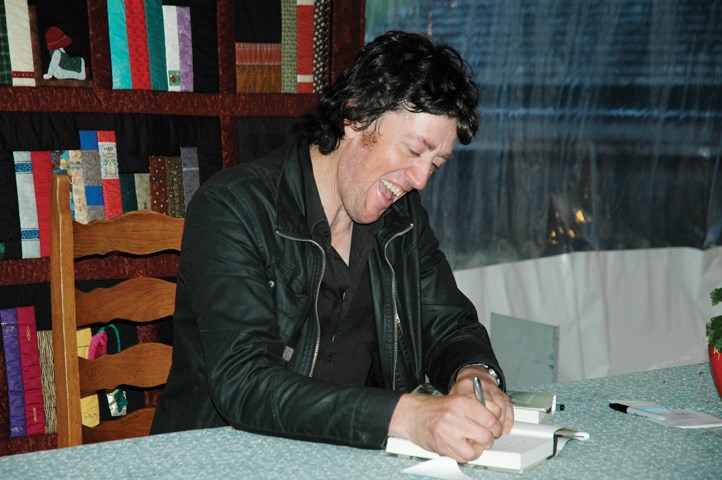Overheard in the line-up of audience waiting to hear a speaker at the 33rd annual Festival of the Written Arts in Sechelt last weekend: “There’s no such thing as an uninteresting writer, is there?”
Certainly the boring need not apply for this festival’s intensive love affair with the book.
Here is just a sampling of this year’s highlights. Michael Winter was my personal “find” of the weekend. The tall, lanky, grinning Newfoundlander spoke about the moment of his “first ambush of feeling about the war.” Though a short story writer, his latest work, Into the Blizzard: Walking the Fields of the Newfoundland Dead, is the result of research into the hundreds of men from his province who fought and died in World War I. He described tracing the footsteps of those soldiers, discovering that a piece of earth in France had been turned into a little bit of Newfoundland with the aid of money raised by the women back home.
“It was moving to be in the place,” he said, “and feel the aura of tragedy that occurred.”
The esteemed Canadian author Jane Urquhart (Away, The Stone Carvers), was visiting the festival for the fourth time. Exposing her Irish roots, Urquhart read from her latest, Night Stages, set in a remote part of Ireland and in Canada. It’s historical fiction at its finest.
Those who managed to get a ticket for Camilla Gibb were leaving the Rockwood Pavilion starry-eyed. Those who emerged from Cathie Borrie’s talk, based on her book about her mother’s dementia, were profoundly moved. Billeh Nickerson was a fan favourite as a host poet, while Kevin Chong sketched in the life of Canada’s stereotypical capitalist, E.P. Taylor, and the racehorse Northern Dancer.
How had readers of mysteries not heard of Barbara Fradkin’s books about likeable, average Ottawa policeman, Michael Green? Fradkin’s experience as a retired psychologist adds depth to crime fiction.
Alison Pick explored a family secret that was “bigger than poems would allow.” A Christian, she discovered that she was of Jewish heritage and made the decision as a young, married woman to convert to Judaism.
“You can’t choose to be one of the chosen people,” she pointed out, but after much study and discussion she took on the religion of her ancestors, described in her book, Between Gods.
This year’s Bruce Hutchison lecture turned the spotlight on a part of Canada most of us have never visited. Inuit Sheila Watt-Cloutier, a high profile environmental and human rights activist, talked to the audience in a direct and down to earth manner as if we were seated at her kitchen table. Melting ice and resource-hungry outsiders threaten their way of life.
“The Arctic is better known for its wildlife than its people,” she said. It’s not about the cola-drinking polar bears on TV, but about the hunting, fishing, gathering people who have now become statistics for suicides and alcoholism. She spoke of forced relocations of whole families that has left a sad mark, and of the children who were sent away to school where they lost their language and ways. “Much of our self-confidence was beaten out of us,” she said.
How can we help in this battle to maintain human rights in the north? Watt-Cloutier acknowledged that the October election would be one active step. She also said: “Understand the story at a deeper level and your own wisdom will kick in.”
Understanding stories is what this year’s festival was all about.



